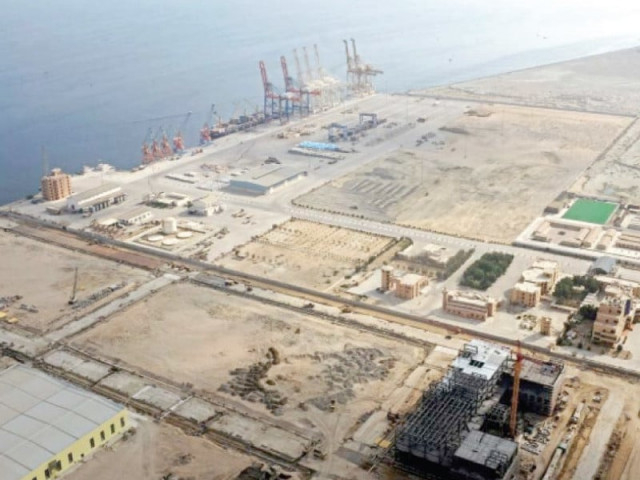Dues of Chinese plants soar to Rs529b
Beijing seeks more fiscal incentives for investment in Special Economic Zones

The outstanding dues of Chinese power plants have increased to a record Rs529 billion due to Pakistan’s apathy towards these investors, as Beijing seeks more fiscal incentives for investment in the Special Economic Zones of the China-Pakistan Economic Corridor (CPEC).
The government on Tuesday reviewed the status of Chinese investment and the security issues being faced by them in the first meeting of the Cabinet Committee on Chinese Investment Projects (CCoCIP). Planning Minister Ahsan Iqbal chaired the meeting.
It emerged during discussions that the outstanding dues of the Chinese energy plants had surged to Rs529 billion. The power purchase payments to the Chinese suppliers are not matching with their invoices due to Pakistan’s failure to stem the circular debt and implement the Energy Framework Agreement in true letter and spirit.
The meeting deliberated on the outstanding issues concerning CPEC’s independent power producers (IPPs), which were a major impediment to the financial close of key projects, according to a statement issued by the Ministry of Planning.
Ahsan Iqbal told the IPPs to submit details of the amount owed to them in the context of CPEC energy projects as soon as possible, according to the ministry. However, these details are already available with the government.
Under the 2015 agreement, Pakistan is legally bound to set up a revolving fund to protect the Chinese investors from the circular debt. The government has opened a Rs48 billion account, which hardly caters to the need.
The Chinese government has not accepted the revolving account arrangement and is asking Pakistan to honour its agreements.
Because of the delay in settlement of the Rs529 billion dues, two Chinese-sponsored power plants having combined capacity of 1,824 megawatts are facing difficulties in achieving the financial close.
Sources said that the Chinese developer of the Rashakai Special Economic Zone had termed the existing fiscal incentives insufficient to attract investment into the zone.
It has repeatedly requested for exemption from customs duty and sales tax on the imported raw material and semi-finished products to be used for processing and production. They have also asked for preferential electricity prices and stable power supply.
Ahsan Iqbal emphasised the importance of providing electricity to the SEZs at an incentivised cost while ensuring that the government did not incur losses, according to the planning ministry. He directed the involvement of the board of directors to expedite the resolution of SEZ-related issues.
A directive was issued to conduct a comparative study on the incentives offered to the SEZs in regional countries to ascertain how Pakistan’s SEZs and Export Processing Zones (EPZs) could be made more attractive.
The planning minister instructed the Board of Investment (BOI) and the Ministry of Commerce to explore the creation of EPZs to attract industries from China to Pakistan by identifying the potential products for relocation.
The focus was on developing a strategy to achieve export surplus to meet both local and international demand.
Strategies to ensure the security of Chinese nationals in Pakistan were also discussed, emphasising the need for community awareness regarding their contributions to Pakistan’s development.
The planning minister emphasised that security measures should instill confidence rather than fear. He underscored the importance of employing modern technology, akin to the developed nations, to monitor the activities of non-state actors and anti-national elements.
Furthermore, the minister highlighted the adverse effects of imposing undue hardships on citizens, as it created a negative perception among foreign visitors. It was also noted that efforts were imperative to dispel the negative image of being a high security risk nation globally.
Highlighting the recent visit of China’s deputy prime minister at the 10th anniversary of CPEC, the minister outlined five corridors for future collaboration as announced by the deputy prime minister of China for the CPEC Phase 2.
The five corridors include the corridor of economic development, corridor of job creation, corridor of innovation, corridor of green energy and corridor of inclusive regional development.
Pakistan has proposed the date of May 24 for the 12th Joint Cooperation Committee (JCC) meeting and is now waiting for the Chinese response.
The meeting also discussed preparatory measures, including potential discussions at the JCC to finalise outcomes prior to the prime minister’s forthcoming visit to China, said the ministry.
Ahsan Iqbal directed the line ministries to expedite the meetings of Joint Working Groups (JWGs) and finalise projects for presentation at the upcoming JCC meeting.
He concluded the meeting by emphasising the need for a national agenda to identify Pakistan’s priorities in collaboration with China, ensuring fruitful discussions at the upcoming JCC.
Published in The Express Tribune, May 1st, 2024.
Like Business on Facebook, follow @TribuneBiz on Twitter to stay informed and join in the conversation.



















COMMENTS
Comments are moderated and generally will be posted if they are on-topic and not abusive.
For more information, please see our Comments FAQ